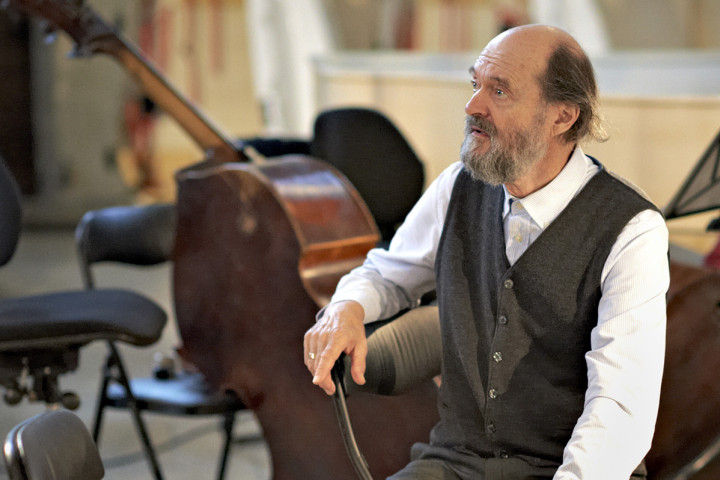Living a poetic life is indeed for everyone–not just for writers and composers. St. Porphyrios says that poetic hearts embrace love and sense it deeply.
He who dwells in the shelter of the Most High will abide in the shadow of the Almighty. I will say to the Lord, “My refuge and my fortress, my God, in whom I trust.”
Psalm 91

To pursue Beauty and Goodness is to live poetically. And to live poetically is not an orientation exclusive to artists, writers, and painters. Indeed, to live poetically is the life of one who is truly human, truly alive, truly present and open to God, Creation, and one’s neighbour.
But let’s begin with an artistic example …
Arvo Pärt

In a master class by Arvo Pärt on his composition Spiegel im Spiegel, the composer reflects on the importance of each note.
A need to concentrate on each sound, so that every blade of grass would be as important as a flower. It could be like a break on the radio. Such signals sometimes sound as if they lasted an entire life. Or future, or past, outside time. Like I said: a blade of grass has the status of a flower. To see in this tiny phrase something more than just the black and white key … It’s not the tune that matters so much here … it’s the combination, the triad that makes such a heart-rending union. The soul yearns to sing it endlessly
Arvo Pärt Master Class Spiegel im Spiegel
To compose a single note with as much care as one would gaze at and admire a flower; but then to see a simple blade of grass holding just as much value … To care for each word, each note … To hold a blade of grass in your hand and know it and love it … I heard one say that if one wants to learn to draw one should simply sit and stare at a blade of grass long enough to draw it. If you can draw a blade of grass, you can draw anything …
Let’s move on beyond art …
Indeed Pärt’s love for the single note and the blade of grass is reminiscent of Fr Lev Gilet and Saint Porphyrios.
The Cosmology of Poetic Living

Love is limitless in space. Have you ever read the 104th Psalm? In the Orthodox Church it is said every evening at the beginning of Vespers … In it the whole universe passes by the mountains and the sea, the wind and the storms, the wild beasts and the humblest little animals, the trees and the rocks. It is a whole cosmology, which ought to guide our piety towards avenues far wider than any ‘private’ relationship with God. What we need to do is let ourselves be carried away by the immense current of Limitless Love by that impulse that progression of all of nature which according to Saint Paul awaits liberation from the consequences of the Fall. Nevertheless we must beware lest any ascent of man towards God obscures for us the descent of God towards man.
Father Lev Gilet shows us the cosmological nature of our relationship with God. We raise our minds, our hearts, our groaning, our praises to God as all of creation does, from the greatest galaxy to the smallest humble creature, and even the blade of grass.
Take a flower in your hand, take a stone. Ponder upon them, not from the scientific angle of the botanist or the geologist, but from the spiritual viewpoint. Each of them is an epitome of the evolution of the world towards the total Christ of whom Saint Paul speaks.
Take a flower in your hand …
As Christ is the Logos, the underlying Principle and Order of all that is, the flower, the stone point back to the Word that wrought them and ahead to their culmination in the new heaven and earth. Far from ‘mere matter’ the flower, the stone, the grass blade point us to Christ.
They are also signs of Love coming towards us, revealing itself to us, giving itself to us, coming ever closer and closer. Gaze on the divine beauty in a blade of grass, in a leaf, in a branch. Perceive an offering in a scent, in a colour. Let us integrate our spiritual lives with the life of the universe. Let us recognize in every creature a spring of divine Love fitting to itself, and to itself along. The Lord Love has loved each grain of sand, each stone, each leaf, each shrub, each animal.
In everything see Christ
To live poetically is more than just ‘being present’ for the blade of grass or flower; it is to see the Lord Love loving all of it. It is connecting to Christ through a ‘presencing with’ nature around you; to not only see something beautiful, but to see it as loved deeply by God. And then to enter into it …
To unite ourselves to all this, to enter into that great rising and falling tide of love, to adore God and to give thanks to Him in the name of nature (which cannot speak)–this is ‘cosmic piety’. This tour reply to Limitless Love.
/cdn.vox-cdn.com/uploads/chorus_asset/file/19397812/1048232144.jpg.jpg)
Surrounded by nature, we can enter into it and there find Love Himself. Art then arises from the soul that loves the Beautiful and seeks to create out of that union with the cosmos and draw others into it.
Do you love the sun? Do you love the starts? Do you love the galaxies? Do you thank God for their creation and for their presence? Do you enter into divine Love for all that exists? It is not so easy.
It isn’t easy … What is easy is to take it all for granted; to drink up the world, wipe our lips, and seek hungrily for more. It’s harder to offer it up to God in love.
Have you hugged a tree lately …
Have you ever hugged or kissed a tree; kissed one as you would an icon or the Bible or a cross–offering a blessing to the tree, giving thanks for it, acknowledging its blessedness before God, its place in the universe in time and space? The world is ours, created for our enjoyment. But it is also there for us to love, to hug, to kiss, to offer up in thanksgiving. This is how we affirm our identity as priests and affirm the earth as sacred before God.
But what about those beasts that scare us, like spiders and creepy crawlies and … gulp … snakes?
Do you love snakes? But even if we are bitten by a snake, we ought to be able to love it at the very moment when we were bitten because the snake is not to blame, it is simply obeying an imperative of its instinct. The snake, like all nature, has been a victim of the Fall, but the Lord Love has not ceased to love it.
Burning Bush, 19-20
Enter into that which scares you and know you are in the hands of God …
Is that what Father Lev Gilet is getting at here? To love even the snakes and scorpions and offer your forgiveness to them when they have harmed you? St. Paul was indifferent to the snake that bit him on the island of Malta. he simply took the snake off his arm and continued his work.
But there is something about the cosmic piety Father Lev Gilet refers to and living poetically or creatively that really strikes me; there is a connectedness to the earth that we have because Christ the Logos dwells within us. We can live poetically not one intellectually, but ontologically.

Another who writes beautifully about living poetically is St. Porphyrios. In his book Wounded by Love, the blessed saint writes about a “poetical life” while revealing to us how he lives.
Flowers for example have their own grace: they teach us with their fragrance and with their magnificence. They speak to us of the love of God. They scatter their fragrance and their beauty on sinners and on the righteous.
This is living poetically … to see Christ everywhere and in all things, filling all things, loving all things, and entering into union with that love.
Cultivate a poetic soul
For a person to become a Christian he must have a poetic soul. He must become a poet. Christ does not wish insensitive souls in His company. A Christian, albeit only when he loves, is a poet and lives amid poetry. Poetic hearts embrace love and sense it deeply.
Is living poetically only for artists, writers, composers?
No.
In fact, the saint places a limit on what living poetically is: only when one loves, when the heart of the person embraces love and senses it deeply.
The poetic life is for everyone
And this kind of embracing love is for all of us. To be human is to be open to the love of God all around us. To see ourselves placed in a world of order and beauty. To know that we are in the hands of a loving God at all times. That in the same way He looks after the plants, trees, and animals, so even more is He looking after us. Because as Christians we affirm Christ the Logos, we also affirm His Creation. We see ourselves as part of His Creation, not set over against it. Living poetically is also being aware of own being-with the cosmos. To see the entire forest and not just our own little tree.
To live poetically is also to make the most of the present moment, especially those that are beautiful.
To affirm beauty …
Make the most out of beautiful moments. Beautiful moments predispose the soul to prayer; they make it refined, noble, and poetic. Wake up in the morning to see the sun rising from out of the sea as a king robed in regal purple. When a lovely landscape, a picturesque chapel, or something beautiful inspires you, don’t leave things at that, but go beyond this to give glory for all beautiful things so that you can experience Him who alone is comely in beauty. All things are holy–the sea, swimming and eating. Take delight in them all. All things enrich us, all lead us to the Great Love. All lead us to Christ.

Here the saint tells us or instructs us how to live that poetic life–to see everything as holy–as held together and loved by God.
To create art requires us to see things as they are. This is a way of being open to God, to catch a glimpse of the world in its fullness and nakedness at the same time: as holy and vulnerable–resplendent yet fully reliant on God. To see the world in a simple way, to stand in the openness of it is to see things as they are–to see things almost as if in their essence.
Become like a child
To live poetically is also to explore and learn to be childlike. To find things interesting. To see how things work. To be keen. To ask questions. To truly care for what is around you.
Observe all things made by man–houses, buildings (large or small), towns, villages, people and their civilization. Ask questions to enrich your knowledge about each and everything: don’t be indifferent. This makes you meditate more deeply on the wonders of God. All things become an opportunity to join more closely with everything and everyone.

How much is modern society that kind of indifference to anything around us? Stare at your phone, look up for a moment, stare back down at it.
Scroll through Twitter while walking through a park.
Stare down, stare up, stare down again.
Nothing interesting but the endless scroll …
Look up!
The saint is calling us to look up and be attentive to what is going on around us. To put the phone away and take delight not only in the natural world but also in the manufactured world; to allow the ingenuity of human beings to inspire us. To take notice, to be interested. To talk to people around us and ask questions. To enter dialogue. This is living poetically in the built world.
[All things] become occasions for thanksgiving and prayer to the Lord of all. Live in the midst of everything and the Universe. Nature is the secret Gospel … the spiritual mask the man who has the Spirit of God is attentive wherever he passes by; he is all eyes, all senses of smell. All his senses are alert in the Spirit of God. He is different. He sees everything and hears everything: he sees the stone, the birds, the butterfly … When he walks by somewhere, he senses each thing, a fragrance for example.
The one who lives poetically is fully present and fully alive. There is no leaving the present moment–or what we would refer to as despondency–but to be fully open to it. When we are living poetically, we see the Spirit of God and Christ Himself in everything. We become “all eyes and all senses of smell.”
Get out of your own head
How often do we want this aliveness but are too caught up in our own thoughts and schedules and text messages to realize? Sometimes we find ourselves in the midst of a forest or the mountains and don’t realize till we’ve left that not once were we aware of the presence of God.
What about the blade of grass curling out from between two sidewalk stones …
We can see God everywhere.
[The poet] lives amidst everything–the butterflies, the bees, and so on. Grace makes him attentive. He wishes to be together with all things.
This is how we have a poetic soul, how we become poets, how we live poetically. And what strikes me about this orientation to the world is that it is not a mere means to a creative end–we don’t do things so that we can become more creative. Rather, we enter into life, our experiences authentically as ones created in the image and likeness of God. And out of that identity we live as poets, as artists, to express the beauty and struggle of our existence, and ultimately to dwell in the presence of God who is everywhere and filling all things.
